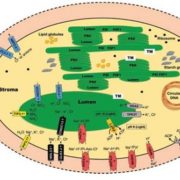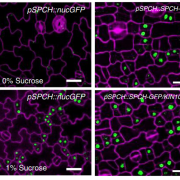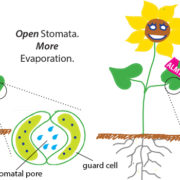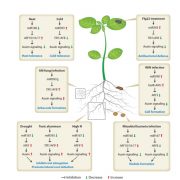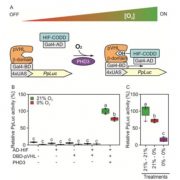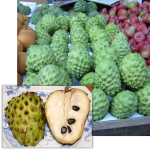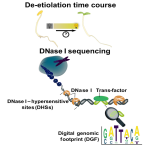Reduction of stomatal density by STOMAGEN paralog editing
 Climate change is having negative effects on yield of economically important crops such as rice. Therefore, there is a pressing need for climate-change adapted crops. Previous research has highlighted that a decrease in stomatal density can enhance drought tolerance. EPIDERMAL PATTERNING FACTOR-LIKE9 (EPFL9), also known as STOMAGEN, expressed in the mesophyll is a positive regulator of stomatal development. Knockout of STOMAGEN in rice using CRISPR/Cas9 resulted in lower stomatal density and greater water conservation, but also decreased carbon assimilation, which is essential for crop productivity. Therefore, Karavolias et al. devised a means of fine-tuning stomatal density while maintaining productivity in rice by editing EPFL10, a recently diverged close relative (paralog) of STOMAGEN. Stomatal density was decreased to only 25% of wildtype in the stomagen mutants, but to 80% of wildtype in the epf10 mutants. The epf10 mutants showed similar positive effects on water conservation as the stomagen mutants, but showed normal levels of carbon uptake and thermoregulation. These results show the potential of paralog editing for tuning stomatal density, which might be extended to other crops to improve their adaptability to abiotic stresses. (Summary by Idowu Arinola Obisesan, @IdowuAobisesan) Plant Physiol. 10.1093/plphys/kiad183
Climate change is having negative effects on yield of economically important crops such as rice. Therefore, there is a pressing need for climate-change adapted crops. Previous research has highlighted that a decrease in stomatal density can enhance drought tolerance. EPIDERMAL PATTERNING FACTOR-LIKE9 (EPFL9), also known as STOMAGEN, expressed in the mesophyll is a positive regulator of stomatal development. Knockout of STOMAGEN in rice using CRISPR/Cas9 resulted in lower stomatal density and greater water conservation, but also decreased carbon assimilation, which is essential for crop productivity. Therefore, Karavolias et al. devised a means of fine-tuning stomatal density while maintaining productivity in rice by editing EPFL10, a recently diverged close relative (paralog) of STOMAGEN. Stomatal density was decreased to only 25% of wildtype in the stomagen mutants, but to 80% of wildtype in the epf10 mutants. The epf10 mutants showed similar positive effects on water conservation as the stomagen mutants, but showed normal levels of carbon uptake and thermoregulation. These results show the potential of paralog editing for tuning stomatal density, which might be extended to other crops to improve their adaptability to abiotic stresses. (Summary by Idowu Arinola Obisesan, @IdowuAobisesan) Plant Physiol. 10.1093/plphys/kiad183


